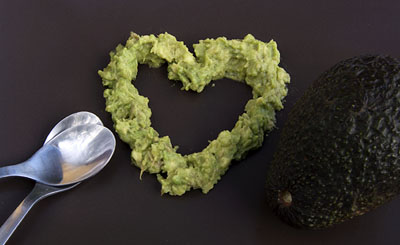Healthy Fats, Healthy Heart, Happy You
February 9, 2015In recent years we’ve heard all sorts of advice on how to approach the fat content in our diets: cut back, eat freely or unsaturated only? What about low-carb/high-fat diets?
Now we know that fats—especially the kinds that supply us with heart-healthy fatty acids—aren’t the enemy. In fact, we should make a point to include them. Here’s how.

Facts on Fats
There is dietary fat, body fat and blood fat…saturated fat, unsaturated fat and trans fat…no wonder so many of us get confused on this topic! We should note, we all need some fat in our diets and in our bodies to be healthy—our bodies don’t make all the fatty acids we require. But eating a high-fat diet, especially if it comes from processed or fast foods, is certainly not necessary, either. Plus, the intake from fats in our foods does not equal the amount of fat in our bodies or bloodstream.
What to do? Focus on eating natural sources of fats from whole foods, as listed below. Emphasize the unsaturated and avoid the trans (or, hydrogenated). Also, remember that it is possible to have too much body fat or high levels of blood fats (like cholesterol or triglycerides) regardless of your body weight, or even if your diet consists of mostly carbs and protein. So, stay current on your health and fitness screenings to keep all these levels in check.
Benefits of Fats
Fatty acids are responsible for many critical functions in our body systems, including cell development, vitamin synthesis, and reducing inflammation. However, our bodies cannot produce two essential fatty acids (EFAs), called linoleic acid and alplha-linoleic acid (also known as omega-3 and omega-6 fatty acids). So, we must get them from the foods we eat.
Fat-soluble vitamins like A, D and E, are carried around the body by fats. Tissue growth and repair is aided by fats. Fat also contributes to healthy skin, and even plays a role in development of eyesight and brain function in children. While there is a wide range of recommendations among experts, and even countries, for the intake of fats, we know that regular eating of food items like fatty fish, nuts or certain plants, helps promote overall health and lowers the risk of several diseases.
Our Favorite Fats
If you’re looking for a way to feel more satisfied with your diet, try adding healthy fats like the following list. Our recipe below uses four of these five ingredients!
- Olives and olive oil (monounsaturated fat)
- Avocado (monounsaturated fat)
- Oily fish like tuna and salmon (omega-3 fatty acids)
- Eggs (yolks carry a mix of unsaturated and saturated fat)
- Nuts (most all are a good source of heart-healthy unsaturated fat)
Spicy Tuna Avocado Salad
INGREDIENTS
- 1 5-ounce can of tuna (preferably sustainable and packed in oil) drained
- ½ ripe avocado, flesh lightly mashed
- 2 stalks raw celery, chopped
- 2 large green onions, chopped
- 1 tsp. lime juice
- 1 tbsp. olive oil
- 2 tbsp. fresh cilantro or flat leaf parsley, chopped
- sea salt (to taste)
- minced fresh jalapeno (optional, to taste)
- small squeeze of wasabi paste (optional, to taste)
DIRECTIONS
Gently mix all ingredients in a bowl. For a larger meal with additional healthy fats, protein and fiber, serve the tuna salad in the other half of the avocado (pit removed), on top of a bed of salad greens, topped with walnuts or sunflower seeds, and drizzle with olive oil.